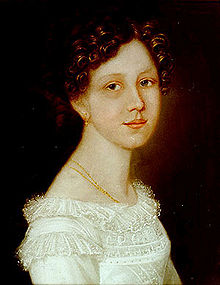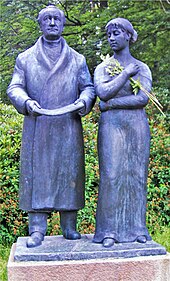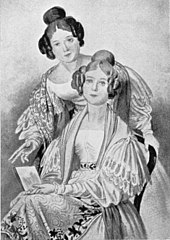Ulrike von Levetzow
Theodore Ulrike Sophie von Levetzow (* February 4, 1804 in Leipzig , † November 13, 1899 at Trziblitz Castle ) was perhaps the last fall in love with the German poet Johann Wolfgang von Goethe .
Life
Ulrike von Levetzow, the eldest daughter of the Mecklenburg-Schwerin Chamberlain and later Court Marshal Joachim Otto Ulrich von Levetzow and Amalie von Brösigkes , after an early divorce of their parents (1806) and remarriage of their mother in June 1807 with Friedrich Carl Ulrich von Levetzow, a younger cousin her first husband, educated in a French boarding school for girls in Strasbourg. She was followed by the sisters Amélie (1806–1831) and, from their mother's second marriage, Bertha von Levetzow (1808–1839) and a half-brother (* 1810) who died as an infant.
Johann Wolfgang von Goethe fell in love with seventeen-year-old Ulrike in 1821 during a lengthy spa stay in glamorous Marienbad . Stefan Zweig worked on this in a literary chapter in the great moments of mankind . Goethe felt "a great passion". At the third meeting in 1823 he is said to have even induced Grand Duke Karl August of Saxe-Weimar-Eisenach to court the nineteen-year-old on his behalf. It is not documented, but Zweig's source is Ulrike's report, which was recorded more than 60 years later.
In it, she describes Goethe's application submitted by the Grand Duke as follows: "I have already said that the Grand Duke was very friends with my grandparents and my mother, and he had often seen us as children; he was very friendly and gracious to all of us and it was he who told my parents and me too that I would like to marry Goethe; at first we took it for a joke and said that Goethe certainly did not think about what he contradicted and often repeated it, even to me The most attractive side described how I would be the first lady at the court in Weimar, how much he, the prince, wanted to distinguish me, he would set up a house in Weimar for my parents and hand it over to my parents so that they would not live apart from me, for mine He wants to care for the future in every way (...). "
Goethe expressed the pain of saying goodbye to Ulrike, the Polish pianist Maria Szymanowska and other friends of the happy summer of 1823 in his Marienbad Elegy , which he began to write back in September 1823 when he left Bohemia for Thuringia and Ulrike's existence found out about Levetzow only after Goethe's death. Goethe wrote in his diary on September 19, 1823: “The copy of the poem has been completed.” The elegy was preceded by the motto borrowed from Tasso : “And when man falls silent in his torment / God gave me a message of what I suffer . "
Ulrike von Levetzow later stated in her brief memories of Goethe that she “had no desire to get married”, and in fact she remained unmarried until the end of her life. She was annoyed that she was said to have a love affair with Goethe, and she clearly rejected it. Accordingly, she only loved Goethe “like a father”. When she was still old, she wrote a kind of counter-statement in an autobiographical sketch in order to refute "all the false, often fabulous stories that were printed about it" and to clarify: "It was not a love affair".
Since 1835 Ulrike von Levetzow was honorary canon of the Protestant monastery Stift zum Heiligengrabe , without ever having visited the monastery. She died at the old age of ninety-five on her large Trziblitz estate, which she had inherited from her stepfather. Dagmar von Gersdorff notes in her book "Goethe's late love": "On November 13th, 1899 a card from the valet Josef Konrad reported that the Baroness had slept quietly and without pain this morning." On Ulrike von Levetzow's coffin "They put a wreath sent from Weimar. It consisted of autumn flowers that had grown in Goethe's garden."
Ulrike von Levetzow bequeathed Gut Trziblitz to her nephew, the kuk Oberst a. D. Adalbert von Rauch (1829–1907). In 1901, Adalbert von Rauch sold Trziblitz to the city of Most (German: Brüx). The regional museum of Most shows today in its permanent exhibition the Salon Ulrike von Levetzows from Trziblitz with parts of the original equipment. Paintings, engravings and original photos also provide information about Ulrike von Levetzow's relatives Levetzow-Rauch.
Martin Walser made Stefan Zweig's story of the aging Goethe's love for Ulrike the subject of his novel A Loving Man . In this story, Ulrike received a copy of the Marienbad elegy during Goethe's lifetime. A scenic version had its world premiere in 2010 in a production by Ansgar Haag at the Meininger Theater in the presence of the author.
An Ulrike von Levetzow hiking trail leads from the small town of Groitzsch to her supposed birthplace of Löbnitz , a district of Groitzsch.
literature
- Robert Steiger, Angelika Reimann: Goethe's life from day to day . Zurich, 1982–1996, 8 vols.
- Friedemann Needy : The loveliest of the loveliest figures. Ulrike von Levetzow and Goethe (= Rororo 23849). Rowohlt-Taschenbuch-Verlag, Reinbek near Hamburg 2005, ISBN 3-499-23849-7 .
- Beate Borowka-Clausberg: Back then in Marienbad ... Goethe, Kafka & Co. - the noble world is healing. Edition Ebersbach, Berlin 2009, ISBN 978-3-938740-87-3 .
- Joachim Fernau : It was nice in Marienbad. Goethe's last love. FA Herbig, Munich et al. 1982, ISBN 3-7766-1220-7 .
- Dagmar von Gersdorff : Goethe's late love. The story of Ulrike von Levetzow (= Insel-Bücherei. No. 1265). Insel Verlag, Frankfurt am Main et al. 2005, ISBN 3-458-19265-4 .
- Johann Wolfgang v. Goethe, Ulrike von Levetzow: "... It wasn't a love affair". A collection of texts. Edited by Jochen Klauß. Manesse-Verlag, Zurich 1997, ISBN 3-7175-8224-0 .
- Bruno W. Reimann: Goethe's amours. Love fury and madness. Eckhaus-Verlag, Weimar 2019, ISBN 978-3-945294-25-3 .
- Maria Schierling: Levetzow, Ulrike. In: New German Biography (NDB). Volume 14, Duncker & Humblot, Berlin 1985, ISBN 3-428-00195-8 , p. 392 f. ( Digitized version ).
- Sylk Schneider : Ulrike von Levetzow - The Brazilian Suleika. In: Sylk Schneider: Goethe's journey to Brazil, a journey of thought of a genius. wtv, Weimar 2008, ISBN 978-3-937939-69-8 , pp. 138-146.
- Astrid Seele: Women around Goethe (= Rororo 50636 Rowohlt's monographs ). Revised new edition. Rowohlt, Reinbek near Hamburg 2000, ISBN 3-499-50636-X .
- Peter Uhrbach: Goethe's Fraulein in Bohemia. Ulrike von Levetzow. A woman from Leipzig of old Prussian origin. Life testimonies and living conditions. Sax-Verlag, Beucha 2009, ISBN 978-3-86729-050-0 .
- Johannes Urzidil : Goethe in Bohemia. Artemis-Verlag, Zurich / Stuttgart 1962, especially pp. 155–178.
- Martin Walser : A loving man. Novel. Rowohlt, Reinbek near Hamburg 2008, ISBN 978-3-498-07363-3 .
- Klaus Hansel: The ladies of honor from Heiligengrabe Abbey , in: Der HEROLD Heft 11/1992, pp. 303–309.
Web links
- Literature by and about Ulrike von Levetzow in the catalog of the German National Library
- Literature about Ulrike von Levetzow in the state bibliography MV
- FemBiography: Ulrike von Levetzow
- Extract from the baptismal register of the Gatzen church
- Goethe's last great love in Martin Walser's novel A loving man - read and discussed in the FAZ Reading Room , February 2008
Individual evidence
- ↑ On the question of the place of birth see discussion.
- ↑ quoted in: Dagmar von Gersdorff: Goethe's late love; The story of Ulrike von Levetzow, Frankfurt am Main and Leipzig: Insel Verlag 2005, p. 62
- ↑ Dagmar von Gersdorff: Goethe's late love; The story of Ulrike von Levetzow, Frankfurt am Main and Leipzig: Insel Verlag 2005, p. 110
- ↑ ibid
- ↑ Regional Museum Most (accessed August 11, 2017)
- ↑ Schwäbische Zeitung - October 2, 2010 edition
| personal data | |
|---|---|
| SURNAME | Levetzow, Ulrike von |
| ALTERNATIVE NAMES | Levetzow, Theodore Ulrike Sophie von (full name) |
| BRIEF DESCRIPTION | German baroness, last love of Johann Wolfgang von Goethe |
| DATE OF BIRTH | February 4, 1804 |
| PLACE OF BIRTH | Leipzig |
| DATE OF DEATH | November 13, 1899 |
| Place of death | Trziblitz Castle |



